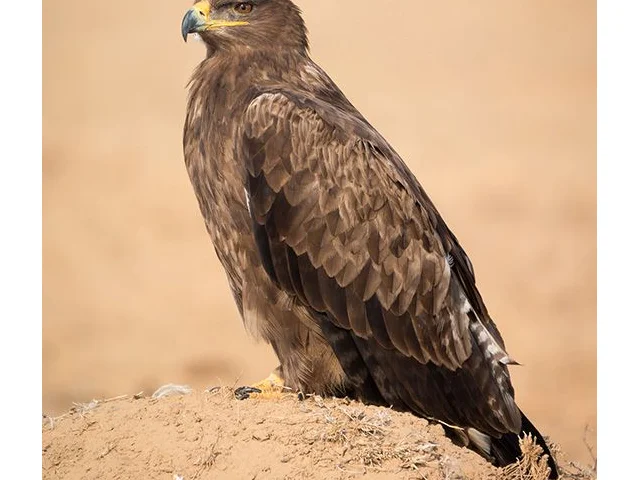Vulture-killing drug kills eagles too

New findings show that vulture-killing drug diclofenac is also fatal to other birds of prey, the RSPB has revealed. The news comes just months after it was announced that the veterinary drug has been licensed for use in Europe.
In a paper published yesterday (27 May) in peer-reviewed journal Bird Conservation International, researchers revealed the results of tests carried on out two Steppe Eagles found dead at a cattle carcass dump in Rajasthan, India. Both birds had diclofenac residue in their tissues and exhibited the same clinical signs of kidney failure as seen in Gyps vultures experimentally given the drug.
Dr Toby Galligan, RSPB conservation scientist and one of the authors of the paper, said: “We have known for some time that diclofenac is toxic to Gyps vultures, including Eurasian Griffon Vulture, but we now know it is toxic to an Aquila eagle too. This suggests that the drug is fatal to a greater number of birds of prey in Asia, Europe and around the world. We had suspected as much from observed declines in non-Gyps vultures in Asia, but this study confirms our worst fears.”
Diclofenac is used as an anti-inflammatory for livestock. However, it proved toxic to the vultures that fed on the carcasses of animals that had been treated with the drug, causing an unprecedented decline in South Asia’s Gyps vulture populations. Numbers of three species – Oriental White-backed, Long-billed and Slender-billed Vultures – fell by more than 97 per cent between 1992 and 2007, equating to the loss of tens of millions of individuals.
Steppe Eagles are closely related to Golden Eagles, the vulnerable Spanish Imperial Eagle and other globally vulnerable or declining Eurasian eagles. Scientists now fear that all species in the Aquila genus are susceptible to diclofenac. With 14 species of Aquila eagle distributed across Asia, Africa, Australia, Europe and North America, this means that diclofenac poisoning should now be considered a global problem. Spain, home to Spanish Imperial Eagle as well as eight of Europe’s 10 vulture species, is one of the countries where diclofenic is available.
Dr Galligan continued: “In light of recent developments in Europe, our findings take on an even more worrying meaning. All of Europe’s charismatic Aquila eagles, like Spanish Imperial Eagle and, closer to home, Golden Eagle, are opportunistic scavengers and could be at risk of diclofenac poisoning. As we have seen in South Asia, wherever free-ranging livestock are treated with diclofenac, population declines in vultures and eagles can occur. The European Commission needs to recognise this problem and impose a continent-wide ban on veterinary diclofenac before it can impact on our birds.”
The UK’s Veterinary Medicines Directorate (VMD), the agency that regulates veterinary medicines, announced measures against the drug: “As a precautionary measure the VMD will not approve any requests from vets to import products containing diclofenac. Furthermore, the VMD has agreed not to issue any export certificates which name diclofenac-containing products in the list of products to be exported.”
Saving Asia’s Vultures from Extinction (SAVE) is a consortium of international organisations created to oversee and co-ordinate conservation, campaigning and fundraising activities to help the plight of South Asia’s vultures. SAVE is working to stop veterinary use of diclofenac by advocating vulture conservation to governments and raising awareness of alternative drugs that are just as effective in treating cattle to veterinarians and livestock owners. For more information visit save-vultures.org.

